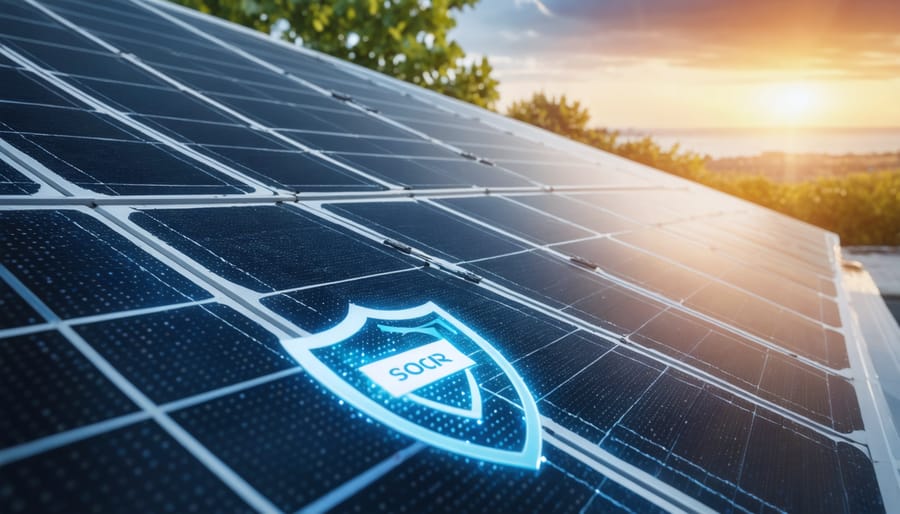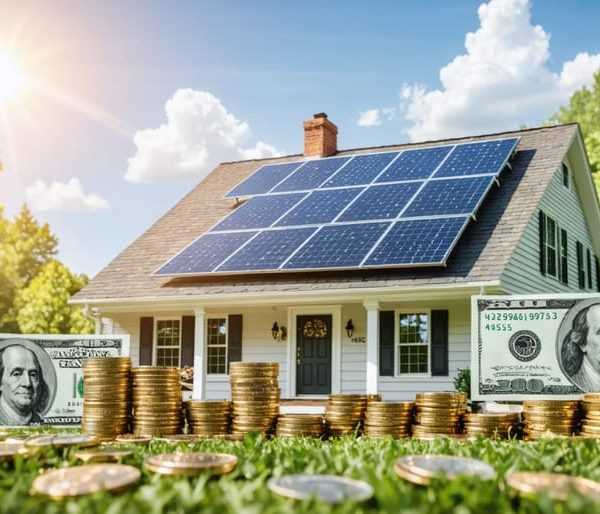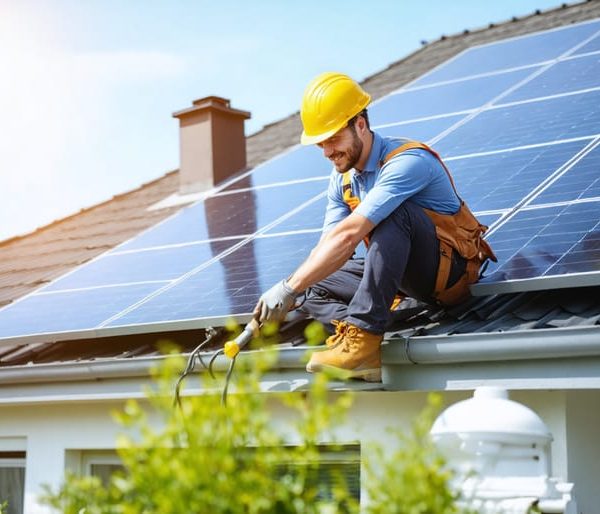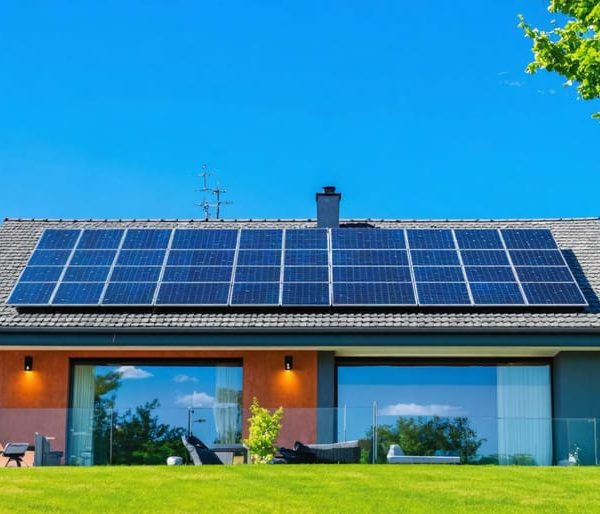Solar Product Certifications That Actually Protect Your Investment
Solar industry certifications safeguard your renewable energy investment and ensure optimal system performance. Whether you’re exploring solar PPA programs or planning a direct purchase, understanding these quality markers separates reliable equipment from questionable alternatives.
Three primary certification types protect solar consumers: UL listings verify individual component safety, IEC standards ensure international quality compliance, and NABCEP credentials validate installer expertise. Each certification plays a distinct role in delivering safe, efficient, and long-lasting solar installations.
For homeowners and property managers, these certifications translate directly into real-world benefits: reduced insurance costs, increased property values, and guaranteed compatibility with utility interconnection requirements. By choosing certified equipment and installers, you’re not just meeting code requirements – you’re investing in proven performance standards that maximize your renewable energy returns.
Before signing any solar contract, verify these essential certifications:
– UL 1703 for solar panels
– UL 1741 for inverters
– NABCEP certification for installation professionals
– IEC 61215 for module durability
These standards represent your first line of defense against subpar equipment and installation practices.
Essential Solar Panel Certifications
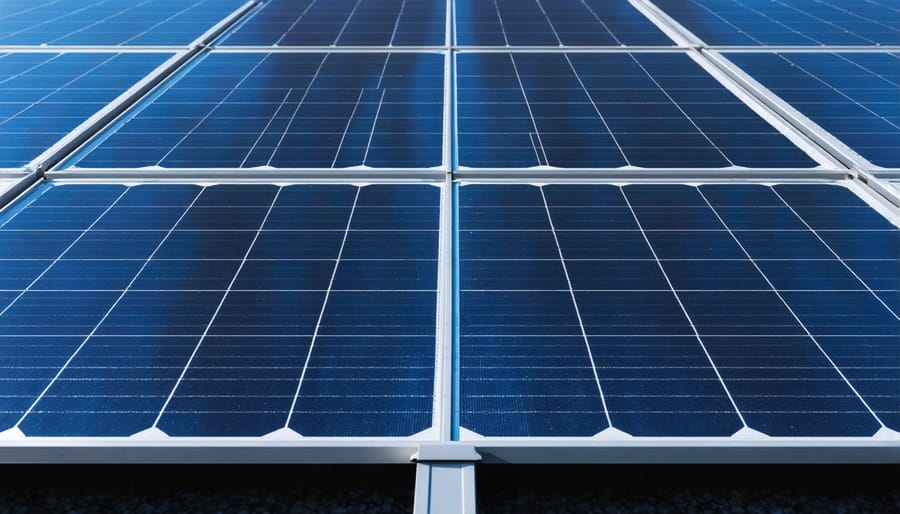
UL 1703 Standard
UL 1703 is a crucial safety standard that ensures solar panels meet rigorous quality and performance requirements before they can be installed on your home or business. Think of it as a “seal of approval” that guarantees your solar panels have been thoroughly tested for safety and reliability.
When a solar panel carries the UL 1703 certification, it means the product has passed extensive testing for fire safety, electrical safety, and structural integrity. These tests simulate real-world conditions, including extreme weather exposure, temperature changes, and various electrical loads to ensure the panels will perform safely throughout their lifetime.
Key aspects tested under UL 1703 include:
– Fire resistance and spread
– Electrical shock protection
– Water spray exposure
– Temperature cycling
– Mechanical load capacity
– Hot-spot endurance
For homeowners and property managers, choosing UL 1703 certified panels provides peace of mind knowing that your solar investment meets nationally recognized safety standards. This certification is typically required by local building codes and insurance companies, making it essentially mandatory for most installations.
Before purchasing solar panels, always verify they carry the UL 1703 certification mark. This ensures you’re investing in equipment that’s been rigorously tested and approved for safe, long-term operation on your property.
IEC Certifications
The International Electrotechnical Commission (IEC) sets the global benchmark for solar equipment safety and performance standards. These certifications are crucial for ensuring that solar products meet rigorous international quality requirements, giving you peace of mind about your investment.
Key IEC certifications in the solar industry include IEC 61215 and IEC 61730. IEC 61215 focuses on the design qualification and type approval of solar modules, testing their ability to withstand various environmental conditions. This means your panels have been proven to perform reliably in real-world situations, from heavy rain to intense heat.
IEC 61730 addresses safety requirements, ensuring that solar panels are electrically and mechanically safe for long-term operation. This certification is particularly important as it covers fire safety, electrical shock protection, and structural integrity – essential factors for any rooftop installation.
For inverters, IEC 62109 is the gold standard, covering safety requirements for power converters used in photovoltaic systems. This certification ensures your inverter will operate safely and efficiently, protecting both your system and your home.
When shopping for solar equipment, always look for these IEC certifications. They’re often displayed on product labels or specification sheets and indicate that the components have undergone extensive testing by accredited laboratories. While they might make products slightly more expensive, these certifications are your guarantee of quality and safety in solar installations.
Inverter and Battery Storage Certifications
UL 1741 for Inverters
When it comes to solar power systems, inverters play a crucial role in converting DC power from your panels into usable AC electricity for your home. UL 1741 is the gold standard certification that ensures your inverter operates safely and reliably, helping you maximize your energy cost savings while protecting your investment.
This certification evaluates inverters through rigorous testing procedures, focusing on safety features like anti-islanding protection (which prevents your system from sending power to the grid during outages) and grid compatibility. Think of UL 1741 as your inverter’s safety passport – without it, most utilities won’t allow connection to their grid.
Recent updates to UL 1741 have introduced even more stringent requirements, including smart grid compatibility and voltage ride-through capabilities. These features help your inverter respond intelligently to grid fluctuations, ensuring stable power delivery to your home.
When shopping for solar equipment, always verify that your inverter carries the UL 1741 certification mark. This certification, combined with other standards like IEEE 1547, creates a robust safety framework that protects both your system and the utility grid. Remember, a properly certified inverter isn’t just about compliance – it’s about peace of mind knowing your solar investment is built to last.
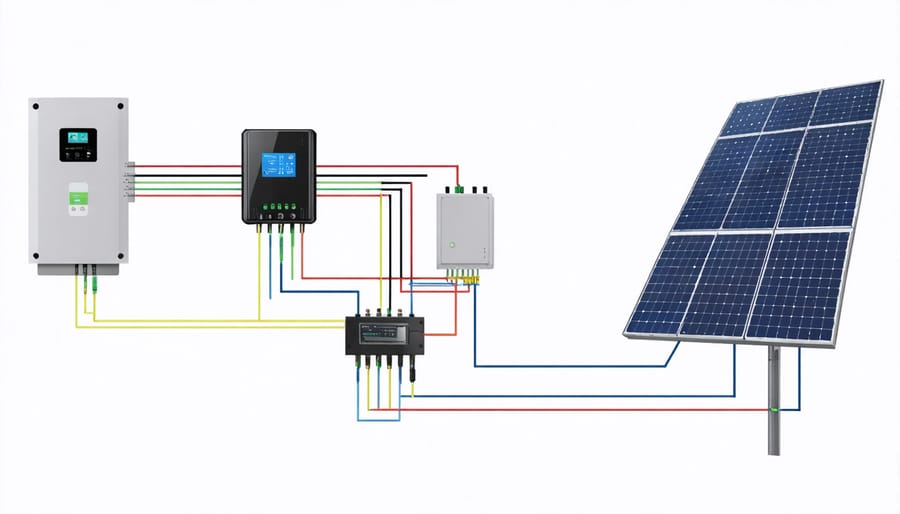
Battery Safety Standards
Battery safety standards are crucial in the solar industry, particularly as energy storage becomes increasingly common in residential and commercial installations. The primary certification to look for is UL 9540, which evaluates the safety of entire energy storage systems. This certification ensures that batteries meet strict fire safety, electrical, and environmental protection requirements.
For individual battery units, UL 1973 certification is essential. This standard specifically tests lithium-ion, lead-acid, and flow batteries for safety during normal use and potential fault conditions. It examines everything from the battery’s thermal management to its ability to withstand physical stress.
When installing battery storage systems, you’ll also want to verify IEC 62619 compliance, which focuses on safety requirements for large-format batteries used in industrial applications. This standard is particularly important for commercial installations where multiple battery units work together.
The UN 38.3 certification is another critical standard, specifically addressing the safe transport of lithium batteries. This becomes relevant when shipping battery components or complete storage systems to installation sites.
Remember that these certifications work together to ensure comprehensive safety coverage. A properly certified battery system will have undergone rigorous testing for electrical safety, fire prevention, environmental protection, and operational reliability. When selecting a battery system, always ask your installer to provide documentation of these certifications to ensure your investment meets all safety requirements.
Installation and System Certifications
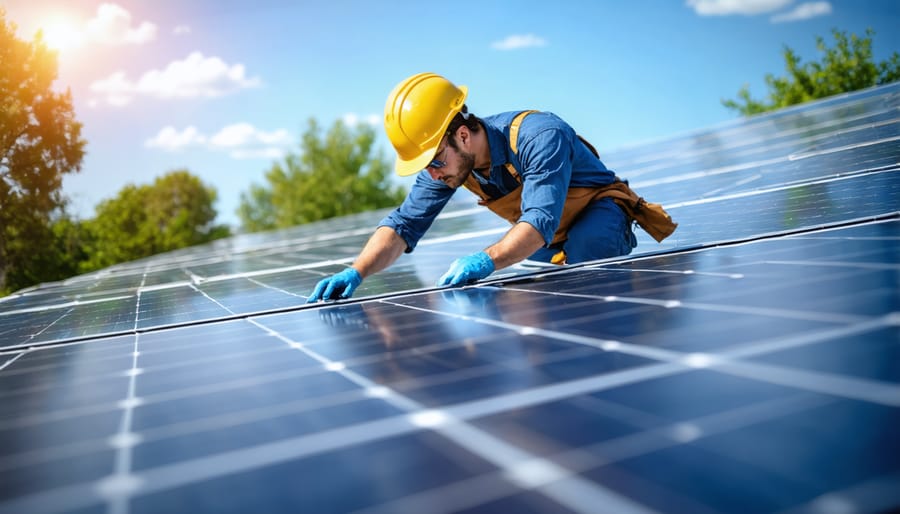
NABCEP Certification
The North American Board of Certified Energy Practitioners (NABCEP) certification is widely considered the gold standard in solar installation credentials. It demonstrates that an installer has achieved the highest level of knowledge and expertise in the solar industry. For homeowners and property managers, choosing a NABCEP-certified installer means working with professionals who have proven their commitment to safety, quality, and industry best practices.
To earn NABCEP certification, installers must complete rigorous training and meet strict requirements, including:
– Documented hands-on installation experience
– Advanced technical training
– Passing a comprehensive examination
– Ongoing professional development
– Adherence to a strict code of ethics
NABCEP offers several certification paths, with the PV Installation Professional Certification being the most recognized. This certification requires at least 58 hours of advanced training and participation in multiple solar installations before candidates can even qualify to take the exam.
For property owners, NABCEP certification provides peace of mind, knowing their solar installation will be performed by qualified professionals who understand current codes, safety protocols, and best practices. Many utility companies and state incentive programs actually require or prefer NABCEP-certified installers for their approved contractor lists.
When selecting a solar installer, always ask about their NABCEP credentials and verify their certification status through NABCEP’s official website. This simple step can help ensure your solar investment is handled by true industry professionals.
System-Level Standards
When it comes to complete solar system certifications, the UL 1741 standard stands as the cornerstone requirement for grid-connected installations. This certification ensures that your entire solar power system works safely and efficiently as a unified whole. Think of it as a seal of approval that confirms all components – from panels to inverters – work harmoniously together.
The IEC 62446 standard is another crucial certification that focuses on system documentation and testing requirements. It provides a framework for proper system installation and maintenance, giving you peace of mind about your investment. Before financing your solar installation, make sure your chosen system meets these essential standards.
For residential installations, the Complete Solar System Certificate of Compliance (CSSCC) offers additional verification of system safety and performance. This certification considers factors like structural integrity, electrical safety, and overall system efficiency. It’s particularly important in areas with strict building codes or extreme weather conditions.
Many utility companies also require IEEE 1547 compliance, which ensures your system can safely connect to the power grid. This standard addresses critical aspects like voltage regulation, power quality, and emergency disconnect capabilities. Remember, a fully certified system not only ensures safety but can also increase your property value and make insurance coverage easier to obtain.
Solar industry certifications play a vital role in ensuring the safety, reliability, and performance of solar energy systems. By understanding these certifications, you can make informed decisions about your solar investment options and protect your renewable energy investment for years to come.
Whether you’re a homeowner or property manager, always work with certified professionals and choose products that meet relevant industry standards. Look for installers with NABCEP certification, equipment with UL listings, and complete systems that comply with local building codes. These certifications aren’t just paperwork – they represent rigorous testing, quality assurance, and commitment to industry best practices.
Ready to take the next step? Start by researching certified installers in your area and requesting quotes from multiple providers. Compare their certifications, experience, and customer reviews. Don’t hesitate to ask questions about specific certifications and what they mean for your installation. Remember that a properly certified solar system not only ensures your safety but can also increase your property value and provide reliable clean energy for decades.
By prioritizing certified products and professionals, you’re making a smart investment in your property’s future while contributing to a more sustainable world. The extra time spent verifying certifications today will pay dividends in system performance and peace of mind tomorrow.

